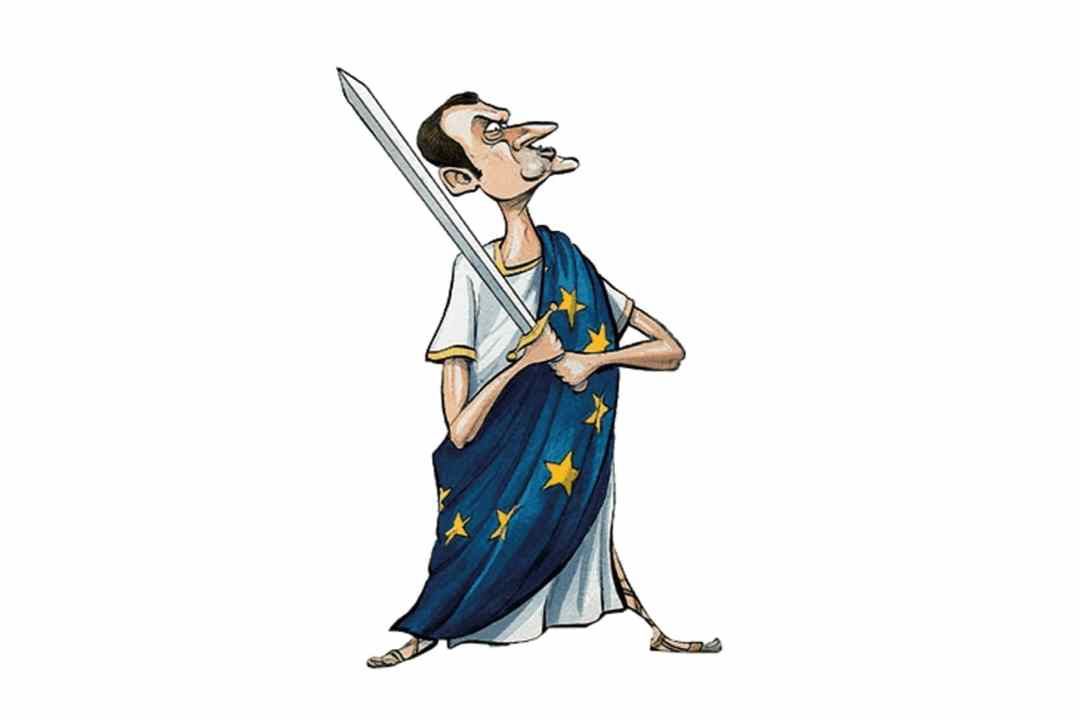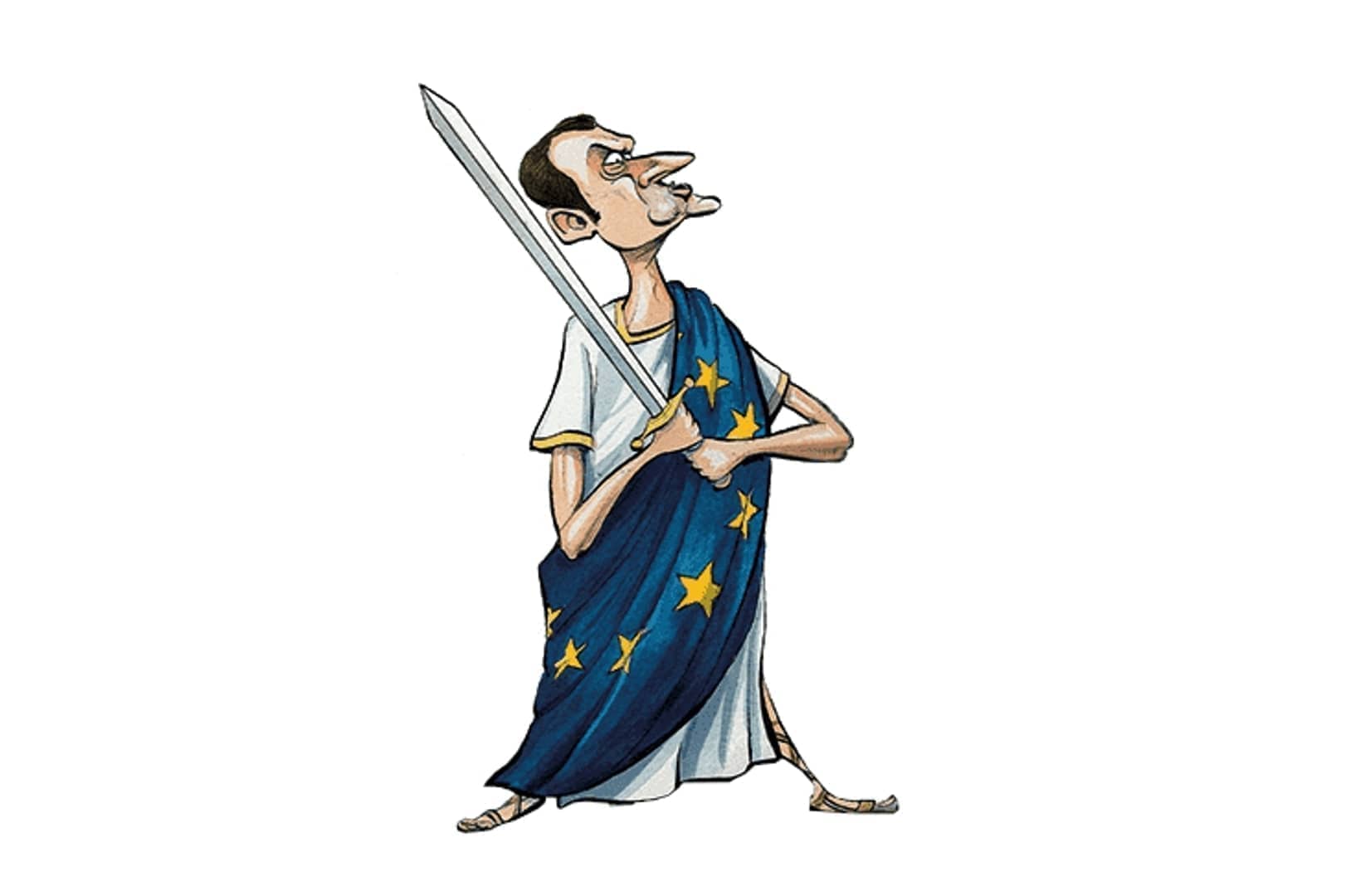Michel Barnier was interviewed on prime time television on Thursday night and not once in his 45 minutes of conversation did he mention the name Emmanuel Macron. There was an indirect reference to the president of the Republic, when Barnier described himself as the ‘anti-Jupiter’ Prime Minister. ‘Jupiter’ was one of the nicknames bestowed on Macron when he came to power in 2017 – and the world, albeit briefly, was fooled into thinking this was a man of rare talent.
The French media appear to be taking their lead from Barnier. There was scant coverage of the president’s visit to Berlin on Wednesday when he spoke at a Global Dialogue event. Fortunately for Macron he did have an audience in European and British journalists, who were present to report his bleak assessment of the European Union. ‘The EU could die,’ he declared. ‘We are on the verge of a very important moment. Our former model is over – we are over-regulating and under-investing. In the two to three years to come, if we follow our classical agenda, we will be out of the market.’
His remarks echo those last month of Mario Draghi, when the former president of the European Central Bank predicted that Europe would suffer a slow and agonising death if it didn’t undergo ‘unprecedented’ reform. ‘For the first time since the cold war, we must genuinely fear for our self-preservation, and the reason for a unified response has never been so compelling,’ announced Draghi in a 400-page report, explaining that Europe required additional annual investment of at least €750 billion – approximately 5 per cent of the EU’s gross domestic product – if the EU is to catch up to America and China.
Referencing Europe’s two competitors, Macron said: ‘They invest much more, they are much more in advance.’ But the Frenchman also accused the pair of flouting convention. ‘When both the US and China do not respect the rules, we should not be the only one in the room to just abide by the rules,’ he said. ‘This doesn’t fly. I don’t suggest trying to become protectionist, this is an awful world, but at least to be fair. With our industry, with our farmers, with our people.’
Macron must have had a sense of déjà vu as he spoke. He’s been urging the EU to get its act together for years, since September 2017, in fact, when he gave a keynote speech at the Sorbonne entitled ‘Initiative for Europe’.
‘What we need is a long-term economic and political strategy,’ declared Macron. ‘And our challenge within the eurozone is to work out how to make it an economic power which can compete with China and the United States, and how to achieve what for the past ten years we have failed to do: to create jobs and ensure that today’s generation.’
That failure now extends to 17 years and there is little sign that the EU will stir itself anytime soon and compete with China and the USA.
The EU’s economy has never been so vulnerable, a fragility embodied by Germany, as Ross Clark recently highlighted. Their economy has now contracted in four of the past seven quarters, and there is no cause for optimism on the horizon.
On the eve of June’s European elections, Gabriel Attal, then Prime Minister, warned the French not to vote for the Euroscepticism of Marine Le Pen’s National Rally. After all, look at those British, still crying over Brexit and wishing they could return to a dysfunctional bloc run by third-rate bureaucrats. Le Pen’s party romped to victory, taking a third of the vote, more than twice that of Attal’s Renaissance party.
Britain, on the other hand, is coping better than its EU neighbours in these harsh economic times. According to the Organisation for Economic Cooperation and Development (OECD), the country’s growth is ‘robust’ and among the G7 countries only America’s economy will perform better this year.
This is a fact that very few of the Paris elite, be they politicians or journalists, can bring themselves to admit. The vast majority worship Brussels with the same dogged and deluded devotion as their president.
The vast majority worship Brussels with the same dogged and deluded devotion as their president
Then Le Monde, the paper of the Progressive Paris establishment, tried something similar in the subsequent parliamentary elections. ‘The economic and political disaster that followed the United Kingdom’s departure from the EU has turned Brexit into a deterrent,’ it declared in an op-ed.
Again, the French people saw through such nonsense and more of them (37 per cent of the popular vote) voted for Le Pen than any other party. They did so because they know what Macron is now realising: that the EU is dying. And it’s taking Macron’s political career with it.









Comments